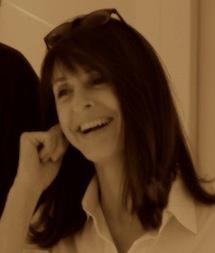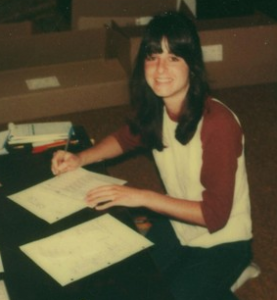A long-lost grandfather who sends letters on aluminum foil and drives a psychedelic-painted school bus. A tenacious granddaughter who feels responsible for healing the rifts in her family going all the way back to the Old Country.
A 14-year old’s quest to find her grandfather It would be stranger than fiction if it weren’t the true story of how genealogist Marla Raucher Osborn got started at age fourteen! This former California lawyer now makes her home in Paris and travels frequently to Galicia to visit her family’s ancestral town of Rohatyn and research in local archives. She writes and speaks extensively both in the U.S. and Europe about her work, especially to Polish and Ukrainian school children.
It would be stranger than fiction if it weren’t the true story of how genealogist Marla Raucher Osborn got started at age fourteen! This former California lawyer now makes her home in Paris and travels frequently to Galicia to visit her family’s ancestral town of Rohatyn and research in local archives. She writes and speaks extensively both in the U.S. and Europe about her work, especially to Polish and Ukrainian school children.
Treelines gave Marla a place to preserve the more personal aspects of her family history than her usual publications afford. She wrote us, “Like sitting down with an old friend and talking – that is Treelines.” She took a break from her busy schedule to share a bit more about herself with us:
You are the author of the most popular story on Treelines so far! How you found your estranged grandfather made strangers cry. What do you think it was about your story that people connected to?
There is a very basic and powerful human desire to be remembered; to project into the future: “I lived,” “I was here.” This, I believe, is the role of memory and therefore of story-telling. Through divorce and economic circumstances, a child was separated from his father; so successfully separated, that not a single photo remained for that child to cherish and pass on to his children. I inherited that void – that empty space – in the family memory. To be able to tell this story is to acknowledge that my grandfather lived and that he is remembered.
As the story of finding your grandfather concluded, it seemed by your arrival in Poland that you had caught the genealogy bug big-time. Why does it matter so much to you to trace your family back and uncover the stories of their lives?
Like many Americans, I am a grandchild of immigrants. For many of us, there is a sense of having been cut off from from our roots. This is particularly powerful for Jewish Americans, but also for immigrant families who then re-settled in California: the move west was like a second emigration and a second window closing on the past. In trying to understand the historic circumstances and the underlying motivations for my grandparents’ moves (from Old World to New World to West Coast World) I learn more about my parents – and about myself. There is an emotional anchoring that comes from this knowledge, and for me, a contentedness that comes from finally becoming “connected.”
What was the experience like for you to share a story about your family publicly on the Treelines site?
 While this was not my first “public” publication, I found writing this story quite different, because it was less record-focused and not specifically directed toward genealogists and researchers. For Treelines, I wanted to recount the path that led me to my grandfather as if it was an intimate conversation between close friends. So, I sought the right “voice” for the narrative and strove to humanize the research side so that the tale that unfolded wasn’t just a lineal recitation of facts through letter writing, archives, and the internet. It was important that the reader “ride” with me, first as a 14-year old child, then as a mature woman winding through the Przemysl Jewish cemetery. The story’s drama, I hope, comes from the unpredictability of its ending – me, thirty years after finding my grandfather, in the Polish town where his family once lived.
While this was not my first “public” publication, I found writing this story quite different, because it was less record-focused and not specifically directed toward genealogists and researchers. For Treelines, I wanted to recount the path that led me to my grandfather as if it was an intimate conversation between close friends. So, I sought the right “voice” for the narrative and strove to humanize the research side so that the tale that unfolded wasn’t just a lineal recitation of facts through letter writing, archives, and the internet. It was important that the reader “ride” with me, first as a 14-year old child, then as a mature woman winding through the Przemysl Jewish cemetery. The story’s drama, I hope, comes from the unpredictability of its ending – me, thirty years after finding my grandfather, in the Polish town where his family once lived.
As one of our first writers, you clearly had a strong sense of what story you wanted to tell. What advice would you give to new users of Treelines who are deciding what stories they want to tell?
Find the kernel – the central, moving, inspiration, emotional core – of your story, and focus on that when you write it. Every family tale has a kernel. It may take some massaging to tease it out, but it is there for you to find and develop. It is the kernel that touches the human heart and turns a personal, individual story into a human story.
Marla’s research in Poland continues in her Treelines story, 1920s Best of Friends.
 Follow
Follow
Loved this Marla—-still learning this Facebook—now how do I save this or delete this?